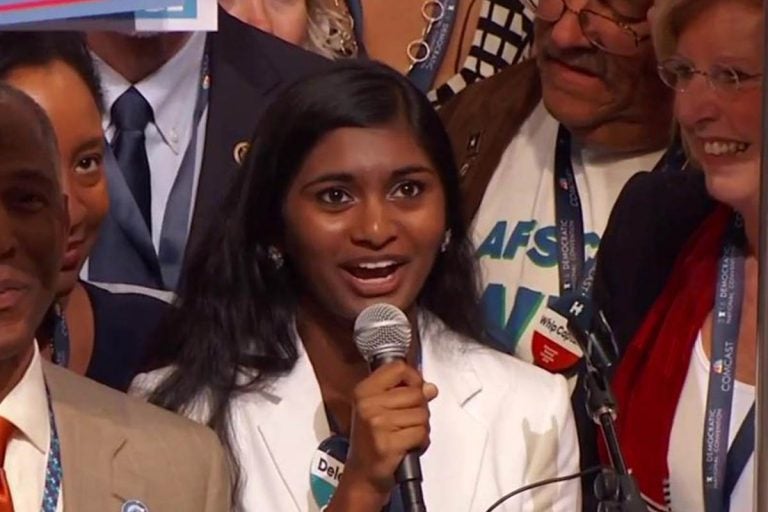Delegate diversity highlights historic Democratic National Convention
Listen
Sruthi Palaniappan
When Baltimore Mayor Stephanie Rawlings-Blake called for the Iowa delegates to cast their votes on Tuesday evening during the Democratic National Convention, the first voice the country heard was barely old enough to vote.
“My name is Sruthi Palaniappan and I am from Iowa. A state of female firsts …”
Palaniappan is a first-generation American whose parents emigrated from India in 1992. She will start at Harvard this fall and — at 18 — was one of the convention’s youngest delegates.
“There truly is this sense of community here,” Palaniappan said, “that we are able to interact with people who come from so many different backgrounds and so many immigrants who were able to come to the U.S. and build a better life for themselves.”
Palaniappan, who grew up in Cedar Rapids, was one of the 292 Asian-American delegates at the DNC. She was elected as one of Iowa’s Hillary Clinton delegates and was one of two 18-year-olds in the Hawkeye State’s delegation.
“I’ve always really been interested in the political process,” she said. “When I found out about this opportunity to get this direct, firsthand experience by witnessing the Democratic National Convention and being able to play a role in it, I jumped right on it.”
It was not an isolated instance of a person of color standing out at the DNC. Palaniappan and other delegates of varying ethnicities, races, and gender identities made the DNC the most diverse ever.
Of the 4,766 total DNC delegates, 2,368 were people of color accounting for nearly half the delegation. The optics bore a stark contrast to the Republican National Convention.
While the RNC notably had just 18 African-American delegates, the DNC had nearly 1,200 — or 25 percent of the total delegation. The Democrats also had 633 delegates who identified as LGBTQ, including Pennsylvania’s Sharron Cooks.
“A lot of the legislators here that I’ve worked closely with in the work that do reached out to me and decided I would be a really great representation for trans women of color and the LGBT community here in Philadelphia,” said Cooks, a first-time delegate.
Cooks, who is African-American, has long been an advocate for trans women of color in Philadelphia, a community that has been the target of harassment and violence. Her support of the Democratic Party is based in its openness and acceptance of the LGBTQ community.
“They’re realizing and being more sensitive and compassionate to the young people that are coming up,” Cooks said. “We’re just regular human beings that want quality of life, that want to have employment non-discrimination — while we do have that in Philadelphia — but locally in other cities, statewide protections as well as federal protections.”
As the general election campaigns begin in earnest, Democratic Party leaders are hoping this diversity could be the difference in electing Hillary Clinton over Republican Donald Trump who has very little support among minority voters.
WHYY is your source for fact-based, in-depth journalism and information. As a nonprofit organization, we rely on financial support from readers like you. Please give today.

